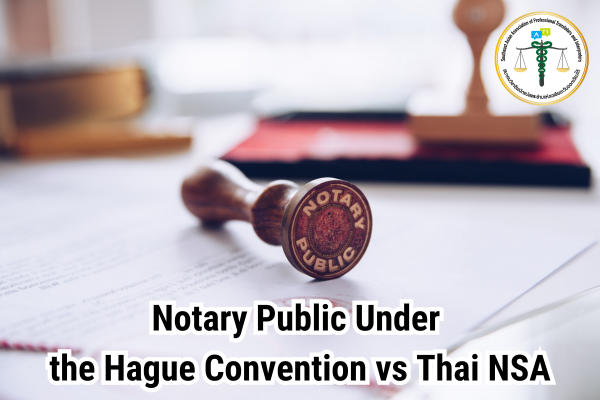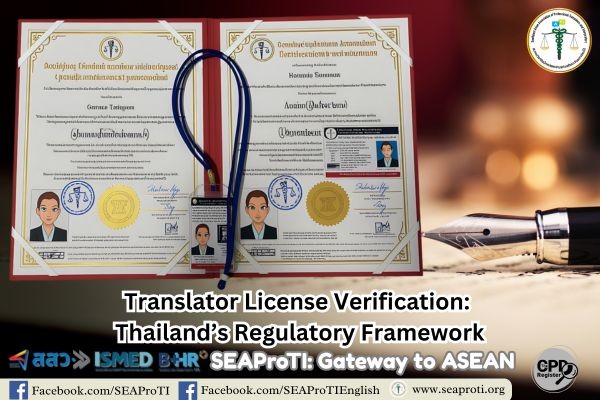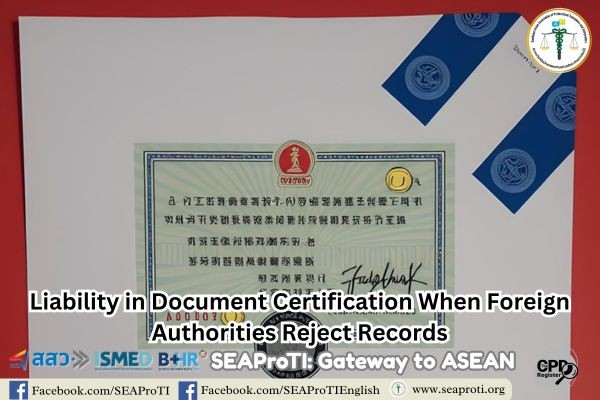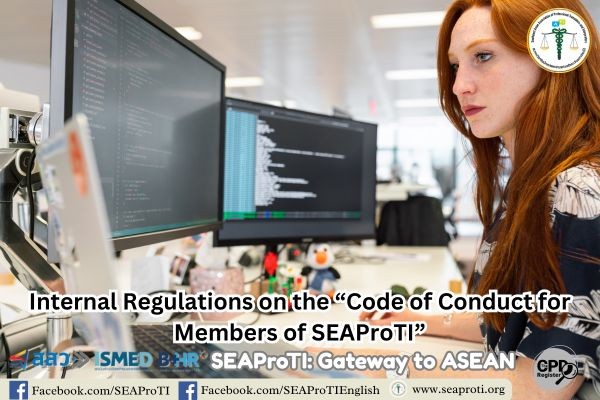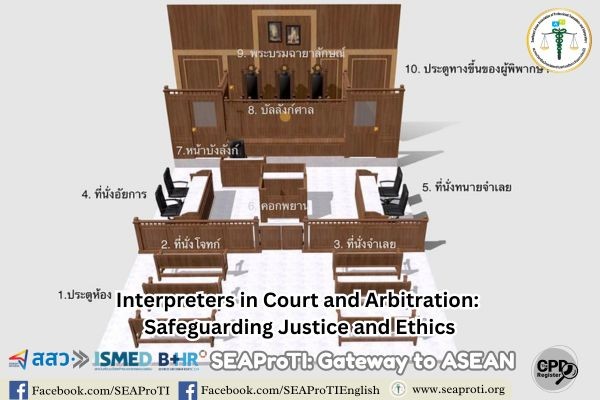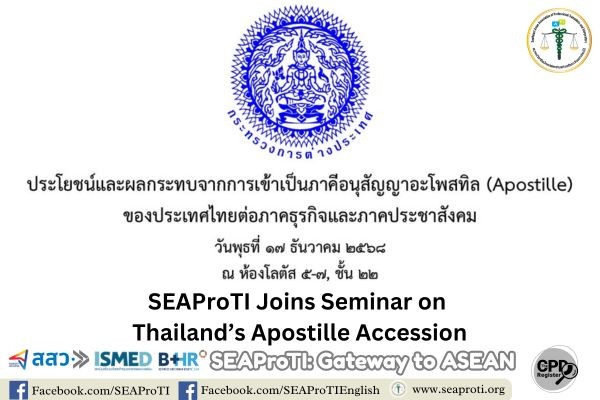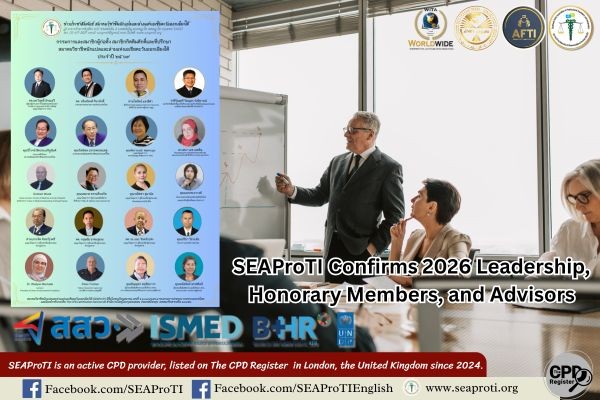The Differences Between “Notary Public”
Under the Hague Convention and Notarial Service Attorneys in Thailand
7 January 2025, Bangkok – In the complex world of legal documents and transactions, the role of individuals responsible for certifying documents is crucial, especially when these documents are intended for international use. The “Notary Public” and “Notarial Service Attorneys” serve as key figures in this process. Although their responsibilities may appear similar, significant differences exist in terms of authority, duties, and recognition on a global scale. This article aims to clarify the differences between these two roles in the context of the Hague Convention and Thailand.
Notary Public Under the Hague Convention
A Notary Public is a legal professional authorized to certify the authenticity of documents, signatures, and the identities of individuals involved in those documents. Their role is particularly important at the international level, especially in countries that are parties to the 1961 Hague Apostille Convention. The convention allows documents certified by a Notary Public to be recognized in other member countries without requiring additional authentication from government authorities in the originating country.
The primary responsibility of a Notary Public is to verify and certify that the documents are genuine and that the signatures were made by individuals who are physically present and identifiable. Their certification process is a key step in obtaining an Apostille, a special seal that confirms the document’s validity for use in other member countries of the convention. This process streamlines document verification across borders and ensures faster, smoother international transactions.
Notarial Service Attorneys in Thailand
In Thailand, the Notary Public system does not exist in the same way as in countries under the Hague Convention. Instead, the equivalent role is performed by Notarial Service Attorneys, who are appointed and regulated by the Lawyers Council of Thailand. These attorneys must complete specialized training and obtain official registration in accordance with the regulations of the Lawyers Council.
The role of Notarial Service Attorneys in Thailand includes certifying signatures, authenticating copies of documents, and certifying translated documents. While their responsibilities closely resemble those of a Notary Public, certifications performed by Notarial Service Attorneys in Thailand are not directly recognized under the Hague Convention. Therefore, documents certified by these attorneys may require additional steps, such as certification by the Department of Consular Affairs at the Ministry of Foreign Affairs or by the embassy of the country where the document will be used.
Differences in Roles and Scope of Work
The key difference between a Notary Public and a Notarial Service Attorney lies in the scope of work and international recognition. Notary Publics are internationally recognized, especially in countries that are members of the Hague Convention. Documents certified by a Notary Public can be used in these countries without further certification. In contrast, the authority of Notarial Service Attorneys in Thailand is limited to the Thai legal framework, and documents intended for international use may require additional verification steps.
Another significant difference lies in governance. Notary Publics in Hague Convention countries are often regulated by independent professional councils or government bodies. In contrast, Notarial Service Attorneys in Thailand are overseen by the Lawyers Council of Thailand, which focuses on maintaining the standards and ethics of legal practitioners.
The Importance of International Document Use
Using certified documents internationally is a complex process that requires an understanding of the legal systems in different countries. Notary Publics under the Hague Convention play a vital role in simplifying this process and enhancing the credibility of documents in international contexts. On the other hand, the Notarial Service Attorney system in Thailand, although not directly recognized internationally, caters effectively to domestic needs and ensures document credibility when additional certifications are obtained.
Conclusion
Notary Publics and Notarial Service Attorneys both play crucial roles in the certification of documents. While their duties may appear similar, they differ significantly in their scope of work and international recognition. Understanding these differences helps ensure that you choose the appropriate service for your needs, whether for domestic or international document use.
Ethics of Thai Notarial Service Attorneys
-
Must uphold integrity.
-
Must maintain responsibility.
-
Must adhere to professional oaths.
-
Must provide services with full competence and quality.
-
Must safeguard clients’ money and assets and return them accurately and completely, including any benefits derived from such money or assets.
-
Must maintain client confidentiality.
-
Must charge fees at a fair rate and clearly notify clients of the service details in advance.
-
Prohibited from engaging brokers, offering commissions, or providing discounts to brokers who bring work to the office.
-
Must not allow unauthorized persons to perform notarial acts under their responsibility.
-
Must securely safeguard official seals to prevent misuse by others.
-
Must avoid actions that could raise ethical misconduct concerns.
-
Must not perform duties when no longer authorized as a notarial service attorney.
-
Must not perform duties when their license has expired.
-
Must not sign or certify blank documents.
-
Must not certify copies of documents without seeing the original.
-
Must not certify signatures or individuals without the person signing in their presence, verifying their identity, or knowing the person.
-
Must not certify false statements, documents, or individuals.
-
Must not certify statements or documents they have not reviewed or verified.
-
Must not certify statements, documents, or individuals where there is a conflict of interest.
-
Must not charge fees or compensation exceeding the legal limit.
-
Must use the official seal of the Lawyers Council.
-
Must maintain a notarial record book with at least the following details:
22.1. Date the document was received.
22.2. Name and address of the person requesting certification.
22.3. Name of the document owner.
22.4. Name and/or type of document.
22.5. Date of certification.
***The record book must be kept for at least 5 years from the date of the last certification to allow for verification.
Source: “Guide for Notarial Service Attorneys” by the Office of Notarial Certification Registration, Lawyers Council of Thailand.
About SEAProTI’s certified translators, translation certification providers, and certified interpreters:
The Southeast Asian Association of Professional Translators and Interpreters (SEAProTI) has officially announced the criteria and qualifications for individuals to register as “Certified Translators,” “Translation Certification Providers,” and “Certified Interpreters” under the association’s regulations. These guidelines are detailed in Sections 9 and 10 of the Royal Thai Government Gazette, issued by the Secretariat of the Cabinet under the Office of the Prime Minister of the Kingdom of Thailand, dated July 25, 2024, Volume 141, Part 66 Ng, Page 100.
To read the full publication, visit: the Royal Thai Government Gazette
ความแตกต่างระหว่าง “โนตารี พับลิค” ภายใต้สนธิสัญญากรุงเฮก
และทนายความผู้ทำคำรับรองลายมือชื่อและเอกสาร (Notarial Service Attorney)
7 มกราคม 2568, กรุงเทพมหานคร – ในโลกของเอกสารและธุรกรรมทางกฎหมายที่มีความซับซ้อน บทบาทของผู้ที่มีหน้าที่รับรองเอกสารถือเป็นสิ่งสำคัญอย่างยิ่ง โดยเฉพาะในบริบทของการนำเอกสารไปใช้ระหว่างประเทศ “โนตารี พับลิค” (Notary Public) และ “ทนายความผู้ทำคำรับรองลายมือชื่อและเอกสาร” (Notarial Service Attorney) เป็นผู้มีบทบาทสำคัญในกระบวนการนี้ แม้ว่าทั้งสองจะมีหน้าที่คล้ายคลึงกัน แต่ก็มีความแตกต่างที่สำคัญในด้านอำนาจ หน้าที่ และการยอมรับในระดับสากล บทความนี้จะช่วยให้คุณเข้าใจความแตกต่างระหว่างสองบทบาทนี้ในบริบทของสนธิสัญญากรุงเฮกและประเทศไทย
โนตารี พับลิค ภายใต้สนธิสัญญากรุงเฮก
โนตารี พับลิค หรือ Notary Public เป็นตำแหน่งทางกฎหมายที่มีบทบาทในการรับรองความถูกต้องของเอกสาร การลงลายมือชื่อ และการแสดงตัวตนของบุคคลในเอกสารดังกล่าว โนตารี พับลิคมีความสำคัญอย่างยิ่งในระดับสากล โดยเฉพาะในประเทศที่เป็นภาคีของสนธิสัญญากรุงเฮก ค.ศ. 1961 (Hague Apostille Convention) ซึ่งกำหนดให้การรับรองเอกสารโดยโนตารี พับลิคสามารถใช้ในประเทศอื่น ๆ ที่เป็นภาคีของสนธิสัญญาได้ โดยไม่ต้องผ่านการรับรองเพิ่มเติมจากหน่วยงานราชการของประเทศต้นทาง
หน้าที่หลักของโนตารี พับลิคคือการตรวจสอบและรับรองว่าเอกสารนั้นเป็นของแท้และลงลายมือชื่อโดยบุคคลที่มีตัวตนจริง การรับรองจากโนตารี พับลิคถือเป็นขั้นตอนสำคัญในกระบวนการที่เรียกว่า Apostille ซึ่งเป็นการเพิ่มตราประทับพิเศษที่ยืนยันว่าเอกสารนั้นสามารถใช้ได้ในประเทศภาคีอื่น ๆ สนธิสัญญานี้ช่วยลดความยุ่งยากในกระบวนการตรวจสอบเอกสารระหว่างประเทศและเพิ่มความสะดวกรวดเร็วในการดำเนินธุรกรรมระหว่างประเทศ
ทนายความผู้ทำคำรับรองลายมือชื่อและเอกสารในประเทศไทย
ในประเทศไทย ระบบโนตารี พับลิคไม่ได้มีอยู่ในรูปแบบเดียวกับในประเทศที่เป็นภาคีของสนธิสัญญากรุงเฮก แต่มีระบบที่คล้ายคลึงกัน คือทนายความผู้ทำคำรับรองลายมือชื่อและเอกสาร หรือ Notarial Service Attorney ซึ่งได้รับการแต่งตั้งและควบคุมโดยสภาทนายความแห่งประเทศไทย ทนายความผู้ทำคำรับรองนี้ต้องผ่านการอบรมและได้รับการขึ้นทะเบียนอย่างเป็นทางการตามข้อบังคับของสภาทนายความ
บทบาทของทนายความผู้ทำคำรับรองในประเทศไทยครอบคลุมการรับรองลายมือชื่อ การรับรองสำเนาเอกสาร และการรับรองคำแปลเอกสาร หน้าที่เหล่านี้มีความคล้ายคลึงกับโนตารี พับลิคในระดับสากล แต่การรับรองเอกสารในประเทศไทยไม่ได้อยู่ภายใต้สนธิสัญญากรุงเฮกโดยตรง ดังนั้น หากต้องการใช้เอกสารที่รับรองโดยทนายความผู้ทำคำรับรองในต่างประเทศ อาจต้องผ่านกระบวนการเพิ่มเติม เช่น การรับรองจากกรมการกงสุล กระทรวงการต่างประเทศ และการรับรองจากสถานทูตของประเทศที่เอกสารจะถูกใช้งาน
ความแตกต่างในด้านบทบาทและขอบเขตการทำงาน
ความแตกต่างสำคัญระหว่างโนตารี พับลิคและทนายความผู้ทำคำรับรองลายมือชื่อและเอกสารคือขอบเขตของการทำงานและการยอมรับในระดับสากล โนตารี พับลิคมีบทบาทที่ได้รับการยอมรับในระดับนานาชาติ โดยเฉพาะในประเทศภาคีของสนธิสัญญากรุงเฮก การรับรองเอกสารของโนตารี พับลิคสามารถใช้งานได้ในประเทศเหล่านี้โดยไม่ต้องผ่านการรับรองเพิ่มเติม ขณะที่ทนายความผู้ทำคำรับรองในประเทศไทยมีอำนาจจำกัดอยู่ในขอบเขตของกฎหมายไทย และการนำเอกสารไปใช้ในต่างประเทศต้องผ่านขั้นตอนเพิ่มเติม
อีกหนึ่งความแตกต่างคือการกำกับดูแล โนตารี พับลิคในประเทศภาคีของสนธิสัญญากรุงเฮกมักจะได้รับการกำกับดูแลจากสภาวิชาชีพที่เป็นอิสระหรือหน่วยงานของรัฐ ขณะที่ทนายความผู้ทำคำรับรองในประเทศไทยอยู่ภายใต้การกำกับดูแลของสภาทนายความ ซึ่งเน้นการควบคุมมาตรฐานและจรรยาบรรณของผู้ปฏิบัติหน้าที่
ความสำคัญของการใช้เอกสารระหว่างประเทศ
การใช้เอกสารที่ได้รับการรับรองในต่างประเทศเป็นกระบวนการที่ซับซ้อนและต้องอาศัยความเข้าใจในระบบกฎหมายของแต่ละประเทศ โนตารี พับลิคภายใต้สนธิสัญญากรุงเฮกมีบทบาทสำคัญในการลดความยุ่งยากและเพิ่มความน่าเชื่อถือให้กับเอกสารในบริบทระหว่างประเทศ ในทางกลับกัน ระบบทนายความผู้ทำคำรับรองในประเทศไทย แม้จะไม่ได้รับการยอมรับโดยตรงในระดับสากล แต่ก็สามารถตอบสนองความต้องการในประเทศและช่วยให้เอกสารมีความน่าเชื่อถือเมื่อผ่านการรับรองเพิ่มเติม
ข้อสรุป
โนตารี พับลิคและทนายความผู้ทำคำรับรองลายมือชื่อและเอกสารมีบทบาทสำคัญในกระบวนการรับรองเอกสาร แม้ทั้งสองจะมีหน้าที่คล้ายกัน แต่ก็มีความแตกต่างในด้านขอบเขตการทำงานและการยอมรับในระดับสากล ความเข้าใจในความแตกต่างเหล่านี้จะช่วยให้คุณสามารถเลือกใช้บริการที่เหมาะสมกับความต้องการของคุณ ไม่ว่าจะเป็นการใช้เอกสารในประเทศหรือต่างประเทศ
จรรยาบรรณทนายความผู้ทำคำรับรองลายมือชื่อและเอกสาร
1. ต้องมีความซื่อสัตย์ Integrity
2. ต้องมีความรับผิดชอบ Responsibility
3. ต้องปฏิบัติตามอาชีวปฏิญาณ Profession
4. ต้องให้บริการด้วยความสามารถเต็มที่และมีคุณภาพ Competence and Quality
5. ต้องเก็บรักษาเงินและทรัพย์สินของลูกความพร้อมทั้งส่งคืนลูกความให้ถูกต้องครบถ้วน รวมถึงผลประโยชน์ที่เกิดจากเงินหรือทรัพย์สินดังกล่าว
6. ต้องรักษาความลับของลูกความ Confidential Information
7. ต้องเรียกเก็บค่าบริการในอัตราที่เป็นธรรม โดยแจ้งรายละเอียดค่าบริการให้ลูกความทราบล่วงหน้าอย่างชัดแจ้ง
8. ห้ามมีนายหน้า หรือส่วนแบ่ง หรือส่วนลดให้แก่นายหน้าที่หางานให้แก่สำนักงาน
9. ต้องไม่ปล่อยให้บุคคลอื่นที่ไม่ได้รับอนุญาตทนายความเป็นผู้ทำคำรับรองลายมือชื่อและเอกสารที่ตนต้องรับผิดชอบ
10. ต้องเก็บรักษาดวงตราสำคัญไว้ มิให้ผู้อื่นนำไปใช้
11. ต้องหลีกเลี่ยงการกระทำที่อาจเป็นปัญหาว่าจะเป็นการประพฤติผิดจรรยาบรรณ
12. ต้องไม่ปฏิบัติหน้าที่ในขณะที่พ้นหน้าที่จากการเป็นทนายความผู้ทำคำรับรอง ฯ
13. ต้องไม่ปฏิบัติหน้าที่ในขณะที่ใบอนุญาตขาดต่ออายุ
14. ต้องไม่ลงนามรับรอง ๆ ในเอกสารเปล่า
15. ต้องไม่รับรองสำเนาเอกสาร โดยมิได้เห็นต้นฉบับที่แท้จริง
16. ต้องไม่รับรองลายมือชื่อบุคคล หรือรับรองบุคคลโดยที่บุคคลดังกล่าวไม่ลงลายชื่อต่อหน้า และไม่ได้ตรวจสอบการแสดงตน หรือไม่เคยรู้จักบุคคลดังกล่าว
17. ต้องไม่รับรองข้อความหรือเอกสารหรือบุคคลอันเป็นเท็จ
18. ต้องไม่รับรองข้อความหรือเอกสารที่ตนไม่รู้เห็นหรือไม่ได้ตรวจสอบ
19. ต้องไม่รับรองข้อความหรือเอกสารหรือบุคคลในส่วนที่มีส่วนได้เสียกับผู้ทำคำรับรอง
20. ต้องไม่เรียกค่าธรรมเนียมหรือค่าตอบแทนสูงกว่าที่มีกฎหมายกำหนด
21. ต้องใช้ดวงตราประทับของสภาทนายความ
22. ต้องจัดทำสมุดทะเบียนคำรับรอง โดยอย่างน้อยต้องมีรายการดังนี้
22.1. วันที่รับเอกสาร
22.2. ชื่อและที่อยู่ของผู้อื่นขอให้ทำคำรับรอง
22.3. ชื่อเจ้าของเอกสาร
22.4. ชื่อและ/หรือประเภทของเอกสาร
22.5. วันเดือนปี ที่ทำคำรับรอง
***ต้องรับรักษาสมุดทะเบียนคำรับรองเพื่อให้ตรวจสอบได้ เป็นระยะเวลา 5 ปีนับจากรายการรับรองครั้งสุดท้าย
ที่มา คู่มือทนายความผู้ทำคำรับรองลายมือชื่อและเอกสาร โดย สำนักงานทะเบียนแบบการรับรองลายมือชื่อและเอกสาร สภาทนายความ
เกี่ยวกับนักแปลรับรอง ผู้รับรองการแปล และล่ามรับรองของสมาคมวิชาชีพนักแปลและล่ามแห่งเอเชียตะวันออกเฉียงใต้
สมาคมวิชาชีพนักแปลและล่ามแห่งเอเชียตะวันออกเฉียงใต้ (SEAProTI) ได้ประกาศหลักเกณฑ์และคุณสมบัติผู้ที่ขึ้นทะเบียนเป็น “นักแปลรับรอง (Certified Translators) และผู้รับรองการแปล (Translation Certification Providers) และล่ามรับรอง (Certified Interpreters)” ของสมาคม หมวดที่ 9 และหมวดที่ 10 ในราชกิจจานุเบกษา ของสำนักเลขาธิการคณะรัฐมนตรี ในสำนักนายกรัฐมนตรี แห่งราชอาณาจักรไทย ลงวันที่ 25 ก.ค. 2567 เล่มที่ 141 ตอนที่ 66 ง หน้า 100 อ่านฉบับเต็มได้ที่: นักแปลรับรอง ผู้รับรองการแปล และล่ามรับรอง


